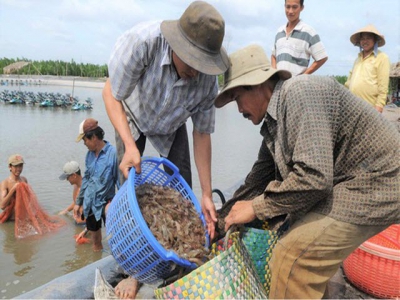Halal food market - great opportunity for Vietnamese agricultural products

According to the Ministry of Industry and Trade (MoIT), the demand for Halal food in the world is increasing, not only among the Islamic community but also non-Muslims. The current global trade in Halal food is estimated at US$80 billion, accounting for about 12 percent of all global trade in agricultural and food products. This brings promising opportunities for enterprises importing and exporting agricultural products and foods in Vietnam.
Seafood has the advantage when exporting to the Halal food market. (Photo: SGGP)
Many enterprises are exploiting well
According to regulations, to export food and processed agricultural products to Muslim countries, enterprises will have to comply with regulations, production, and processing processes of agricultural and food products that meet Halal food standards and must receive a Halal certificate.
Meeting these requirements, at present, some Vietnamese enterprises have been promoting the export of their products to Halal markets, such as Vinamilk, Nestlé Vietnam, and Minh Phu Seafood.
A representative of Minh Phu Seafood Corporation said that the company exports shrimp products to the Islamic market, with each export up to 12 containers.
At its peak, the company can export up to 15 containers per month, about 300 tons. Products for this market account for an average of 3-5 percent of the company's export structure. The representative of this company also said that to successfully export to the Muslim market, Minh Phu must ensure that neither its products nor shrimp feed contains protein from pork.
Ms. Le Thi Thanh Mai, Inter Market Supply Manager at Nestlé Vietnam, said that the Halal food market has great potential and is growing day by day. Nestlé Vietnam has successfully exported thousands of tons of products to consumers in the markets of the Philippines, Indonesia, Malaysia, and the United Arab Emirates (UAE).
With a total estimated population of 400 million people, of which the majority are Muslims, this is one of the market groups that Nestlé sees as potential and will continue to boost exports. The company serves consumers in the aforesaid markets with some product lines, such as oyster sauce, Maggi dipping sauce, Milo powder, Nescafe instant coffee powder, and Nescafe Dolce Gusto instant coffee tablet.
Need to ensure standards
According to the Ministry of Agriculture and Rural Development, the Halal food market is considered to be extremely potential, with a population of about 2 billion people worldwide. With the current food production and processing capability of Vietnam, this is a great opportunity. The potential of market development for this market of Vietnam will be more and more open when enterprises ensure good implementation of Halal's standards. To enter this market, enterprises need to have a certain understanding of the Muslim culture, customs, tastes, and beliefs.
To receive Halal certification, first of all, the raw materials, additives, and chemicals used to produce those products must be proven by reliable invoices and records that clearly state the ingredients. Alcohol is not allowed to use in any way directly in the products. Animal-derived ingredients are required to have Halal certification. Especially, the entire production line of Halal products must be separated from non-Halal products. For enterprises with production lines related to pork on the premises of their factories, they must completely separate those production lines from the Halal product line and must have Muslim people (one person per shift) to participate in the production management of Halal products.
Although the Halal food market has such principles, according to the MoIT, enterprises still have to promote marketing and market research, quickly update changes and new consumption trends consumers in these markets. Ms. Le Thi Thanh Mai shared that each import market will have a different Halal certification unit. For instance, the Indonesian market requires Halal MUI certification, which can take enterprises months for preparation and be assessed, appraised, and certified by the competent authorities of Indonesia.
Có thể bạn quan tâm
 Exports of mango, guava and mangosteen to Russia soar
Exports of mango, guava and mangosteen to Russia soar Việt Nam was the fourth largest supplier of mango, guava and mangosteen to Russia in January this year, reaching 226 tonnes, worth US$807,000, up 114 per cent
 Door opens wide to export Bac Giang’s farm produce
Door opens wide to export Bac Giang’s farm produce Since early this year, the export of farm produce has gained positive signals in the northern province of Bac Giang, offering the locality a chance
 Vietnam Jan-Apr coffee exports likely down 34.2% y/y, rice down 10.8%
Vietnam Jan-Apr coffee exports likely down 34.2% y/y, rice down 10.8% Vietnam’s coffee exports in the first four months of the year likely down 17.6% from a year earlier to 563,000 tonnes, while rice exports likely down 10.8%